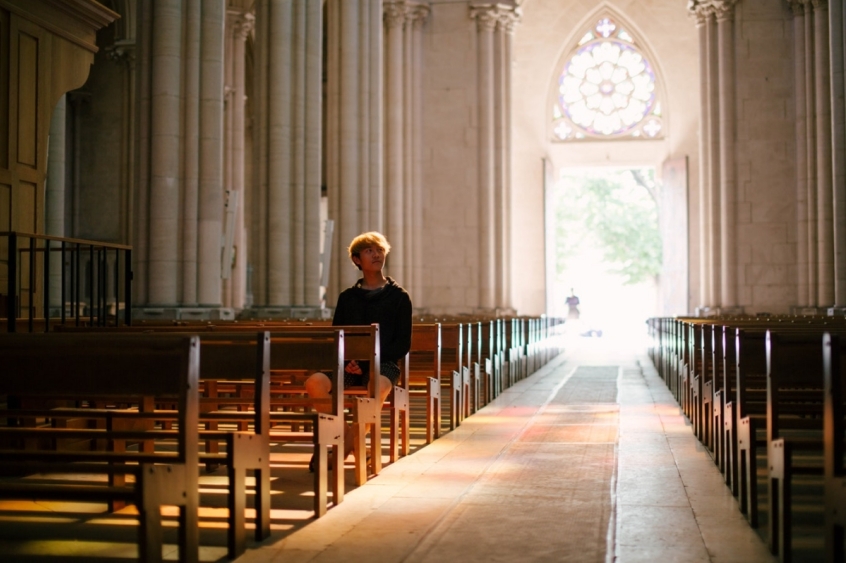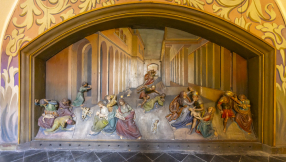While attendance is patchy in other parts of the church, there's one indisputable growth area. Cathedrals, for the most part, are doing rather well. Lots of people go at Christmas, and midweek attendance is up too.
It's entirely possible that one of the reasons for their popularity is the anonymity they offer. The thing that strike anyone who walks into one is how big they are, most of them at least – great cavernous barns of buildings, in which architecture is all, or almost all; people appear something of an afterthought. And counter-intuitive as it is, for many of us, that's absolutely fine.

Bishop Stephen Cottrell put his finger on it at the National Cathedrals Conference in Manchester. He said: 'I think there are thousands and thousands of people who want to come quietly, who even want to come secretly, and it's getting harder and harder to do that in the modern-day bouncy and accessible Church of England.
'So cathedrals have a special vocation and opportunity to be somewhere that you can slip into unseen and slip out of unseen.'
Cathedrals, however, are a special case. Most Christians, or spiritual seekers, don't go to them but to their local church, broadly defined. But the bishop's words ought to give us all pause for thought.
Churches are very quick to make assumptions about what 'people need' or 'people are looking for'. These assumptions aren't usually based on any research, or indeed on any wide experience of human nature: they tend to be projections from the psychology of the 'leaders' or group influencers. So, to take a random sample, people are looking for community; for authenticity; for friendship; for meaning.
And once we've decided what people need, we can work out how to give it to them. So church becomes programmatic, designed to scratch the itches we think people have, and activist, because we like to feel we're in charge of events and able to make things happen.
Of course, it would be absurd to argue that churches shouldn't do anything at all other than open the doors at the beginning of the service and close them at the end. Aside from the continuing effort to reach out to those beyond the fringes of the church altogether, we will think very carefully about how to treat people when they find their way through our doors – not, for many of them, an easy step to take. Yes, some will want to be welcomed, included and signed up to rotas – 'I'd love to come to the weekly house group, thanks so much for asking!' And these are the people who make us feel we're achieving something, because they respond in a measurable way. It's perfectly natural, then, that this kind of approach to this kind of person becomes normative.
But what about all the rest? What about those who don't want to be engaged in conversation, who don't want to stay for coffee and who find exchanging the Peace at communion at best an irritation and at worst an ordeal?
What about those who come to church not to find 'community', but to find God – and who do so in the peace of quiet contemplation and a formal, repetitive liturgy rather than in jolly greetings and audience participation?
Why can't we accept that actually, they're fine?
Yes, some of them might be initially shy, and need bringing out of themselves. But to assume everyone is on a track that leads to full conviviality is plain wrong. We are all different, and we relate to the church community in different ways. Some of us are born as gung-ho joiners. Others aren't, and trying to force everyone into the same mould does violence to our unique, God-given distinctiveness. Not everyone wants to talk. Not everyone wants to pray aloud. Not everyone wants to join a rota, or a Bible study, or – well, any one of the multitude of activities offered by many churches.
Bishop Cottrell is on to something important when he talks about this.
'It is important to realise that people don't just express their belonging in patterns of attendance, but in what they need spiritually when they attend, and some people need space around them,' he says.
"Somewhere where you're less likely to be pounced on, to be asked to join in, where the worship doesn't need you to say anything.'
All churches have a particular character, and that's fair enough. Some may find it harder to grant this kind of space than others. But it's vital that every church resists the impulse to declare, 'This – and this alone – is what faithful Christian discipleship looks like, and it's our way or the highway.' We shouldn't dragoon people into spiritual conformity. They are much too beautifully various for that.
Mark Woods is the author of Does the Bible really say that? Challenging our assumptions in the light of Scripture (Lion, £8.99). Follow him on Twitter: @RevMarkWoods













